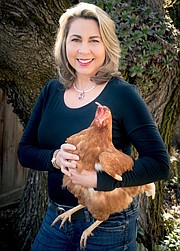Master Gardener: Amending the vegetable garden soil in fall
Feed your soil this fall!
Fall is a great time to recharge your garden’s soil. Soil is the foundation that your garden is built upon, and without healthy soil, you won’t be able to grow a healthy garden.
In order for our gardens to be productive next spring, it’s important to replace the nutrients in the soil that were used by our plants over the summer. Those luscious tomatoes, cucumbers and zucchini are heavy feeders in our gardens and can quickly deplete the soil of nutrients.
Organic soil amendments like compost, leaf mold and well-rotted manures take time to improve the soil. When this material is added to the garden in the fall, it will slowly decompose over the winter and work its way into the soil.
Healthy soil is teeming with life — from macro-organisms like earthworms and pill bugs down to the microorganisms like bacteria, fungi and microbes. These organisms play an essential part in breaking down the organic material and converting it into the nutrients that feed our vegetable plants, and by extension, feed us.
In addition to adding depleted nutrients back into the soil, compost and organic matter work to improve soil by:
- Greatly improving soil texture. This is especially true for sandy or clay soils.
- Promoting moisture retention and good drainage. Organic matter creates pockets for both water and air to move through.
- Encouraging the production of beneficial bacteria and fungi that break down the organic matter and produce soil nutrients. Feed them and they will come!
- Reducing the need for chemical fertilizers, which saves time and money. Soil that is enriched organically needs very little additional fertilizer for plant growth.
Leaf mold is another valuable soil conditioner — and it’s free! Leaf mold is the result of fully decomposed leaves, which creates a rich, dark brown humus with a crumbly texture similar to compost. Where compost adds fertility to the soil, leaf mold greatly improves soil structure — again adding space for air and water.
To create leaf mold, simply place shredded leaves in a pile or bin and allow them to decompose for up to a year to 18 months. Shredded leaves will decompose faster. Use a mower with a bagger attachment to chop leaves — and make quick work of fall cleanup! Leaves will also decompose in a plastic bag with holes punched in it.
After your garden beds have been cleared of remaining debris and weeds, add up to two inches of quality compost to the surface; it doesn’t need to be worked into the soil. On top of the compost add a thick, 3-to-4-inch layer of leaf mold, shredded leaves or straw.
This top layer will help to prevent weeds and soil erosion. In the spring, some of the mulch can be removed or pushed aside for planting. A section of cattle panel or plastic mesh fencing can be placed on top of the mulch to keep it in place, as well as to keep out unwanted critters like cats and squirrels.
You can make your own compost or purchase quality compost by the bag or in bulk. For small gardens or raised beds, purchasing a high-quality bagged compost is a quick and convenient way to enrich your soil. Compost can also be purchased in bulk from nurseries or garden centers.
Before purchasing bulk compost, ask the nursery staff what the compost material is derived from. Some nurseries sell a compost product that consists of sewage sludge or biosolids. The sludge byproducts are processed and treated at very high heat to kill any pathogens and then the material is mixed with other organic matter and sold as compost. This material, while safe, may not be the best choice for an edible vegetable garden.
After a robust summer growing season, amending your soil with compost or other organic materials in the fall is a great way to replenish the soil, leading to healthier soil and healthier plants in the spring.
• • •
Candace Godwin is a Certified Idaho Master Gardener. The University of Idaho Extension, Kootenai County Idaho Master Gardener program is located in the UI Research Park, 958 S. Lochsa St., Post Falls. Learn more about us at https://www.uidaho.edu/extension/county/kootenai/garden or on Facebook. Visit us in person, email us at kootenaimg@uidaho.edu, or call us at (208) 292-2525. IMG services are free to the public.





